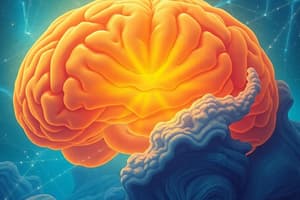Podcast
Questions and Answers
What is lucid dreaming?
What is lucid dreaming?
- The inability to remember dreams upon waking up
- The occurrence of nightmares during the REM sleep cycle
- The ability to control and manipulate dreams while awake (correct)
- The concept of dream interpretation by psychologists
How can reality testing help in lucid dreaming?
How can reality testing help in lucid dreaming?
- By manipulating the dream environment
- By recording dream patterns in a journal
- By inducing a state of deep sleep
- By training individuals to differentiate between dreams and reality (correct)
What is REM sleep primarily associated with?
What is REM sleep primarily associated with?
- Nightmares
- Sleepwalking
- Deep sleep
- Dreaming (correct)
How can mnemonic induction contribute to lucid dreaming?
How can mnemonic induction contribute to lucid dreaming?
What is a common technique used to foster lucidity during dreaming?
What is a common technique used to foster lucidity during dreaming?
Which aspect of dreams can provide insight into emotions and desires?
Which aspect of dreams can provide insight into emotions and desires?
What is the primary function of REM sleep?
What is the primary function of REM sleep?
According to Sigmund Freud, what do dream symbols represent?
According to Sigmund Freud, what do dream symbols represent?
Which psychological theory suggests that dreams reflect universal patterns within human consciousness?
Which psychological theory suggests that dreams reflect universal patterns within human consciousness?
What does Hobson's activation-synthesis hypothesis propose about dreaming?
What does Hobson's activation-synthesis hypothesis propose about dreaming?
Which sleep stage is characterized by vivid dreams and intense brain activity?
Which sleep stage is characterized by vivid dreams and intense brain activity?
What aspect of human experience do dreams remain despite different interpretations?
What aspect of human experience do dreams remain despite different interpretations?
Study Notes
Dreams
Dreams have fascinated humans throughout history. They are a natural part of our sleep cycle and can provide insight into our thoughts, desires, fears, and emotions. Understanding dreams involves exploring various aspects such as lucid dreaming, rapid eye movement (REM) sleep, and psychological interpretations.
Lucid Dreaming
Lucid dreaming is the ability to consciously control and manipulate your dreams while you're asleep. It grants you the freedom to explore, create, and interact within this unique realm. Techniques like reality testing and mnemonic induction can help foster lucidity during dreaming.
Reality Testing
Reality testing is a method used to determine if one is actually awake or still dreaming. By performing simple checks such as reading an image repeatedly before going to bed, comparing perceived distance from objects when fully awake versus in a dream state, and trying to push fingers through other's hands, individuals can train themselves to recognize whether they are experiencing a dream or reality.
Mnemonic Induction
Mnemonic induction is another technique that encourages lucid dreams. This involves keeping a dream journal, staying aware of your surroundings, and focusing your attention on specific images or thoughts just before falling asleep. These practices aim to increase your likelihood of entering a lucid dream state.
Rapid Eye Movement Sleep
Rapid eye movement (REM) sleep is a phase of restorative brain activity characterized by increased metabolic rate, usually accompanied by intense brain activity. During REM sleep, our bodies experience heightened muscle tone and vivid dreams. Research suggests that REM sleep plays a crucial role in memory consolidation, learning, emotional regulation, and stress relief.
Psychology of Dreams
The psychology behind dreams is multifaceted and can vary depending on cultural beliefs and individual perspectives. Some common theories include Sigmund Freud's psychoanalytic approach, Carl Jung's archetypes interpretation, and Hobson's activation-synthesis hypothesis. Each perspective offers unique insights into the possible functions and meanings behind dreams.
Psychoanalytic Approach
Sigmund Freud believed that dreams served as a manifestation of unconscious desires and repressed thoughts. He suggested that dream symbols represented various unconscious conflicts that individuals typically avoided acknowledging while awake.
Archetypes Interpretation
Carl Jung posited that dreams reflect universal patterns, or 'archetypes', inherent within human consciousness. These archetypes are thought to govern our deepest emotions and motivations, influencing our conscious experiences.
Activation-Synthesis Hypothesis
Hobson's activation-synthesis hypothesis proposes that dreaming is primarily driven by brainstem centers attempting to make sense of random signals generated during REM sleep. According to this view, dreams result from these brain regions misinterpreting neuronal activity, leading to bizarre scenarios and narratives.
Regardless of one's belief regarding the purpose or meaning behind dreams, they remain an intriguing aspect of human experience. Further exploration into lucid dreaming techniques, REM sleep stages, and psychological interpretations can provide valuable insight into our nighttime journeys.
Studying That Suits You
Use AI to generate personalized quizzes and flashcards to suit your learning preferences.
Description
Delve into the fascinating world of dreams, exploring topics like lucid dreaming, rapid eye movement (REM) sleep, and psychological interpretations. Learn about techniques such as reality testing and mnemonic induction, as well as theories by renowned psychologists like Sigmund Freud and Carl Jung.




